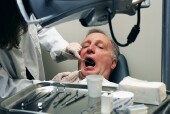
MONDAY, March 29 (HealthDay News) — Fear of the dentist keeps many people from getting the dental care they need, but new research suggests that an ancient Chinese treatment — acupuncture — may provide quick relief.
One in 20 people suffer from odontophobia — severe anxiety about dentistry — and a third of all people say they have moderate anxiety when seeing the dentist, the researchers said.
“We can offer patients a safe, fast and cheap treatment for their odontophobia,” said lead researcher Dr. Palle Rosted, from the department of oncology at Weston Park Hospital in Sheffield, England.
Other available treatments, such as distraction, relaxation techniques, tranquilizers and sedation, can be time-consuming or have side effects, Rosted said. “Moreover, in some patients, the more traditional treatments are not sufficient. By offering acupuncture, the dentist has an extra tool in his bag,” he said.
The report is published in the March 29 issue of Acupuncture in Medicine.
For the study, Rosted’s group tested acupuncture on 20 patients who had suffered from dental phobia for two to 30 years. Their average age was 40, and their anxiety was considered moderate to severe.
Their anxiety was checked before and after five minutes of acupuncture and rated, using the Beck Anxiety Inventory (BAI) questionnaire. The acupuncture treatment, which involves inserting thin needles into specific body points, targeted two points on the top of the head.
The researchers found the average BAI score of 26.5 dropped to 11.5 after the acupuncture session. And all the patients were able to have their dental treatment.
Before trying acupuncture, only six patients could withstand any treatment at all, and even at that, just a partial visit that required a great deal of effort by both dentist and patient, Rosted noted.
“From a scientific point of view, we demonstrated that 70 percent of patients had an effect of the treatment,” Rosted said. “From a practical point of view, and that is the important thing, we demonstrated that it was possible to carry out the planned dental treatment in all patients.”
Acupuncture, practiced in China for more than 2,000 years, is not a miracle treatment, Rosted said. “However, it has some advantages over other treatments. The treatment is safe, fast and cheap. In this study, the dentist could commence the dental treatment five minutes after insertion of the five needles.”
Dr. Marshall H. Sager, a past president of the American Academy of Medical Acupuncture and an acupuncturist in Bala Cynwyd, Pa., was optimistic about the findings. “I believe the results of this preliminary study are wide-ranging and should encompass investigation into the use of acupuncture for all preoperative anxiety,” he said.
Working with dental surgery patients, Sager said the effects of acupuncture are dramatic and beneficial to health. “My experience emphatically demonstrates that, when I administer acupuncture to patients prior to surgery, I am able to decrease their preoperative stress levels, causing them to be more relaxed so that they require less anesthesia during the surgical procedure.”
Evidence shows that acupuncture helps release endorphins, which act not only as painkillers, but as sedatives, he added. “These opiate-like hormones, manufactured in the body, contribute to natural feelings of well-being and modulate anxiety,” he said.
More information
For more information on acupuncture, visit the U.S. National Center for Complementary and Alternative Medicine.

